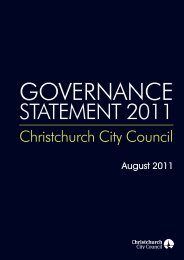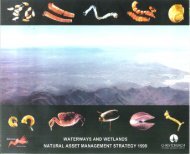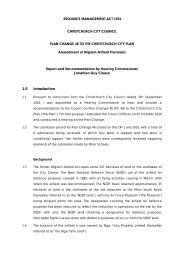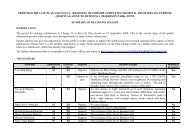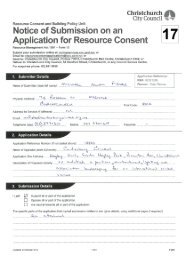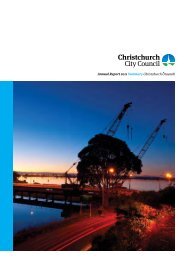Annual Report 2010 - Christchurch City Council
Annual Report 2010 - Christchurch City Council
Annual Report 2010 - Christchurch City Council
Create successful ePaper yourself
Turn your PDF publications into a flip-book with our unique Google optimized e-Paper software.
Financial instrument<br />
risks (continued)<br />
Financial statements<br />
<strong>Annual</strong> <strong>Report</strong><br />
<strong>Christchurch</strong> Otautahi<br />
<strong>2010</strong><br />
p227.<br />
Notes to financial statements<br />
39. Financial instrument risks (continued)<br />
Credit risk management<br />
Credit risk refers to the risk that a counterparty will default<br />
on its contractual obligations resulting in financial loss to the<br />
entity. Financial instruments that potentially subject the group<br />
to concentrations of credit risk consist principally of cash and<br />
short-term investments, trade receivables, loans and interest<br />
rate swaps. The <strong>Council</strong> and group places its cash and short-term<br />
investments with high credit quality financial institutions and<br />
sovereign bodies and limits the amount of credit exposure to any<br />
one financial institution in accordance with the treasury policies of<br />
the respective members of the group.<br />
The <strong>Council</strong>’s Investment policy includes parameters for investing<br />
in financial institutions and other organisations including where<br />
applicable entities that have required Standard and Poor’s credit<br />
ratings.<br />
<strong>Council</strong> receivables mainly arise from statutory functions,<br />
therefore there are no procedures in place to monitor or report the<br />
credit quality of debtors and other receivables with reference to<br />
internal or external credit ratings. The <strong>Council</strong> has no significant<br />
concentrations of credit risk in relation to these receivables, as it<br />
has a large number of credit customers, mainly ratepayers, and the<br />
<strong>Council</strong> has powers under the Local Government (Rating) Act 2002<br />
to recover outstanding debts.<br />
Orion New Zealand Ltd has a concentration of credit risk with<br />
regard to its trade receivables, as it only has a small number of<br />
electricity retailed customers. <strong>Christchurch</strong> International Airport<br />
Ltd also has a concentration of credit risk on a small number of<br />
customers, with 71.0% (2009: 62.0%) of trade receivables due from<br />
10 customers. <strong>City</strong> Care Ltd also has a concentration of credit risk<br />
in respect of its transactions with 47% (2009: 47.0%) of its revenue<br />
derived from its ultimate shareholder, the <strong>Council</strong>. Red Bus Ltd has<br />
a concentration of credit risk with Environment Canterbury, which<br />
provides 59% (2009: 51%) of the company’s revenue.<br />
The group manages its exposure to credit risk arising from trade<br />
receivables by performing credit evaluations on all significant<br />
customers requiring credit, wherever practicable, and continuously<br />
monitors the outstanding credit exposure to individual customers.<br />
With the exception of Orion New Zealand Ltd, which generally<br />
requires collateral security (such as bank letters of credit) from its<br />
electricity retailer customers against credit risk, the group does not<br />
generally require collateral security from its customers.<br />
The carrying value is the maximum exposure to credit risk for bank<br />
balances, accounts receivable and interest rate swaps. No collateral<br />
is held in respect of these financial assets.<br />
The group has not renegotiated the terms of any financial assets<br />
which would result in the carrying amount no longer being past<br />
due or avoid a possible past due status other than trade receivables.





